Tektronix RSA503A
9 kHz to 3 GHz, 40 MHz Acquisition Bandwidth Portable USB Real Time Spectrum Analyzer
Tektronix RSA503A
9 kHz to 3 GHz, 40 MHz Acquisition Bandwidth Portable USB Real Time Spectrum Analyzer
The Tektronix RSA503A Spectrum Analyzer brings real-time spectrum analysis to solving the problems of spectrum managers, interference hunters and network maintenance personnel who need to track down hard to find interferers, maintain RF networks and keep records of their efforts. The heart of the system is a USB-based RF spectrum analyzer that captures 40 MHz real-time bandwidths in harsh environments.
- 9 kHz to 3 GHz frequency range covers broad range of analysis needs
- 9 kHz to 3 GHz frequency range covers broad range of analysis needs
- 40 MHz acquisition bandwidth enables real time analysis for transient capture and vector analysis
- High speed full-span sweeps (70 GHz/sec) for fast setup and discovery
- Standard GPS/GLONASS/Beidou receiver for mapping
- Tracking generator for gain/loss, antenna and cable measurements (Optional)
- DataVu-PC software enables multi-unit recording in variable bandwidths
- SignalVu-PC software offers real time signal processing with DPX
- Mil-Std 28800 Class 2 environmental, shock and vibration specifications for use in harsh conditions
- Internal battery for extended field operations
- Spectrum/Spectrogram to minimize time spent on transient and interference hunting
- EMC/EMI pre-compliance and troubleshooting - CISPR detectors, predefined standards, limit lines, easy accessory setup, ambient capture, failure analysis, and report generation
- 15 usec minimum signal duration with 100% probability of intercept ensure you see problems first time, every time
- Application programming interface included for development of custom programs
Applications
- General purpose spectrum analysis
- Radio network installation and maintenance
- Spectrum monitoring
- Spectrum management
- Interference hunting
- EMI/EMC compliance testing and troubleshooting
- Spectrum operations
- Radiation hazard (RADHAZ) testing
- Emissions control (EMCON) monitoring
- Signal intelligence (SIGINT) monitoring
The RSA503A 9 kHz to 3 GHz, 40 MHz Acquisition Bandwidth Portable USB Real Time Spectrum Analyzer was built to bring real-time spectrum analysis to solving the problems of spectrum managers, interference hunters and network maintenance personnel who need to track down hard to find interferers, maintain RF networks and keep records of their efforts. The heart of the system is the USB-based RF spectrum analyzer that captures 40 MHz realtime bandwidths with great fidelity in harsh environments. With 70 dB spurious free dynamic range and frequency coverage to 3 GHz, all signals of interest can be examined with high confidence in your measurement results. The USB form factor moves the weight of the instrument off of your hands, and replaces it with a lightweight Windows tablet or laptop. Holding a light PC instead of a heavy spectrum analyzer means you can move faster for longer and get your work done faster.
The optional tracking generator (Option RSA503A 04) enables gain/loss measurements for quick tests of filters, duplexers and other network elements, and you can add cable and antenna measurements of VSWR, return loss, distance to fault and cable loss as needed.
SignalVu-PC Software Offers Rich Analysis Capability in the Field
The Tektronix RSA503A operates with SignalVu-PC, a powerful program used as the basis of Tek's traditional spectrum analyzers. SignalVu-PC offers a deep analysis capability previously unavailable in high performance batteryoperated solutions. Real-time processing of the DPX spectrum/ spectrogram is enabled in your PC, further reducing the cost of hardware. Customers who need programmatic access to the instrument can choose either the SignalVu-PC programmatic interface or use the included application programming interface (API) that provides a rich set of commands and measurements directly. Basic functionality of the free SignalVu-PC program is far from basic. Base version measurements are shown below.
The RSA503A Combined with SignalVu-PC Offers Advanced Field Measurements
With 40 MHz of real-time bandwidth, the unique DPX spectrum/ spectrogram shows you every instance of an interfering or unknown signal, even down to 15 μs in duration. The following image shows a WLAN transmission (green and orange), and the narrow signals that repeat across the screen are a Bluetooth access probe. The spectrogram (upper part of the screen) clearly separates these signals in time to show any signal collisions.
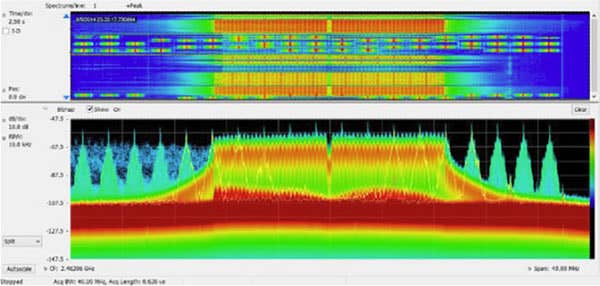
Finding unexpected signals is easy with unattended mask monitoring. A mask can be created on the DPX spectrum display, and actions taken upon every violation, including stop, save a picture, save acquisition, or send an audible alert. In the illustration below, a mask violation has occurred in red on the mask, and a picture of the screen was saved as a result. Mask testing can be used for unattended monitoring and when playing back recorded signals, enabling testing for different violations on the same signals.
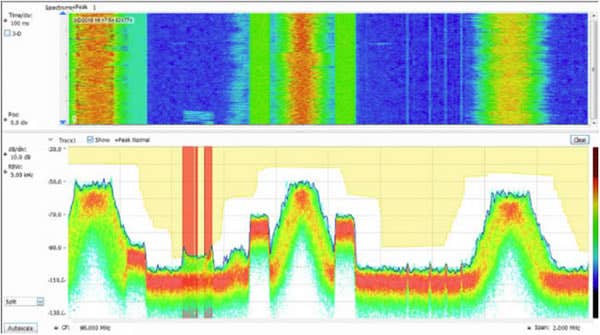
Direction finding and signal strength measurements are quick and easy with the standard SignalVu-PC software. In the illustration below, using the available Alaris smart antenna, a compass continuously monitors antenna direction while the signal strength monitor performs measurements and provide audio indication of signal strength. When combined with the MAP option for SignalVu-PC, signal strength and azimuth are automatically placed on the map of your choice.
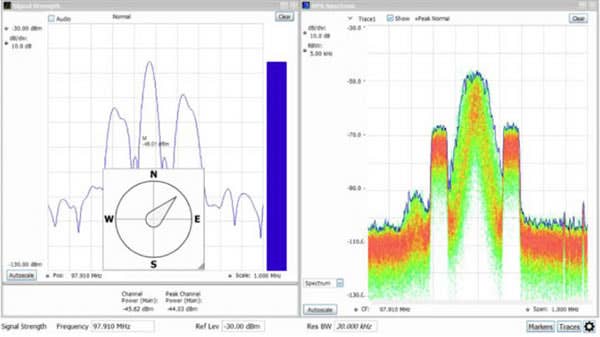
The tracking generator (Option RSA503A 04) is controlled via SignalVu-PC. A bandpass filter response from 800 MHz to 3 GHz is shown below. Option SV60 adds return loss, cable loss, and distance to fault.
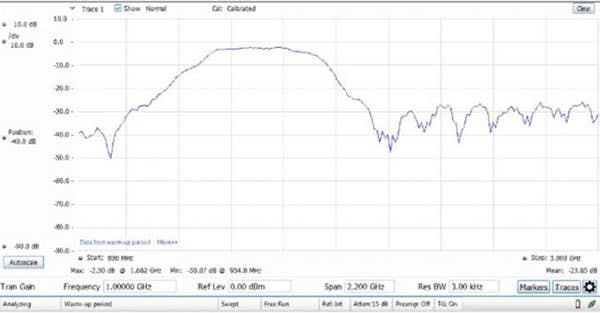
SignalVu-PC Application-Specific Licenses
SignalVu-PC offers a wealth of application-oriented options available either installed on the instrument, or as a floating license that can be moved between instruments or attached to your PC. Applications include:
- General-purpose modulation analysis (27 modulation types including 16/32/64/256 QAM, QPSK, O-QPSK, GMSK, FSK, APSK)
- EMC/EMI analysis with CISPR peak, quasi-peak, and average detectors
- Buetooth analysis of Basic Rate, Low Energy, and Bluetooth 5. Some support of Enhanced Data Rate
- P25 analysis of phase I and phase 2 signals
- WLAN analysis of 802.11a/b/g/j/p, 802.11n, 802.11ac
- LTE FDD and TDD Base Station (eNB) Cell ID and RF measurements
- Mapping
- Pulse analysis
- AM/FM/PM/Direct Audio Measurement including SINAD, THD
- Playback of recorded files, including complete analysis in all domains
- Signal classification and survey
EMC/EMI - EMI pre-compliance and diagnostic measurements are easy with the instrument and SignalVu-PC. Transducer, antenna, preamplifier, and cable gain/loss can be entered and stored in correction files, and the standard spurious measurement feature of SignalVu-PC can be used to establish limit lines for your test. The following illustration shows a test from 30MHz to 960 MHz against the FCC Part 15 Class A limit shown shaded. The blue trace is the capture of Ambient. Violations are recorded in the results table below the graph. CISPR quasi peak and average detectors can be added with option SVQP.
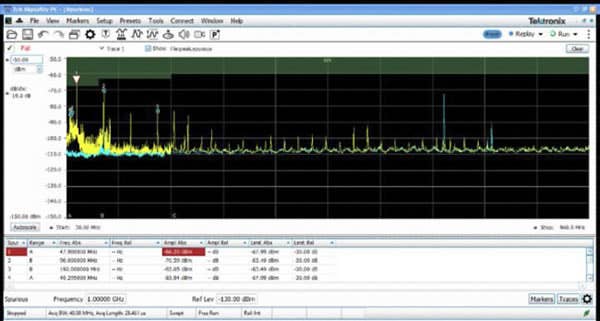
The EMC pre-compliance solution can be added with option EMCVU. It supports many predefined limit lines. It also adds a wizard for easy setup of recommended antennas, LISN, and other EMC accessories with a onebutton push. When using the new EMC-EMI display, you can accelerate the test by applying the time consuming quasi peak only on failures. This display also provides a push-button ambient measurement. The Inspect tool lets you measure frequencies of interest locally, removing the need for scanning.
Bluetooth - Two new options have been added to help with Bluetooth SIG standardbase transmitter RF measurements in the time, frequency and modulation domains. Option SV27 supports Basic Rate and Low Energy Transmitter measurements defined by RF.TS.4.2.0 and RF-PHY.TS. 4.2.0 Test Specification. It also demodulates and provides symbol information for Enhanced Data Rate packets. Option SV31 supports Bluetooth 5 standards (LE 1M, LE 2M, LE Coded) and measurements defined in the Core Specification. Both options also decode the physical layer data that is transmitted and color-encode the fields of packet in the Symbol Table for clear identification.
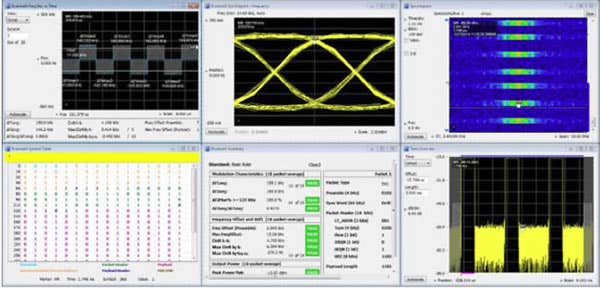
Pass/Fail - Pass/Fail results are provided with customizable limits. The measurement below shows deviation vs. time, frequency offset and drift and a measurement summary with Pass/Fail results.
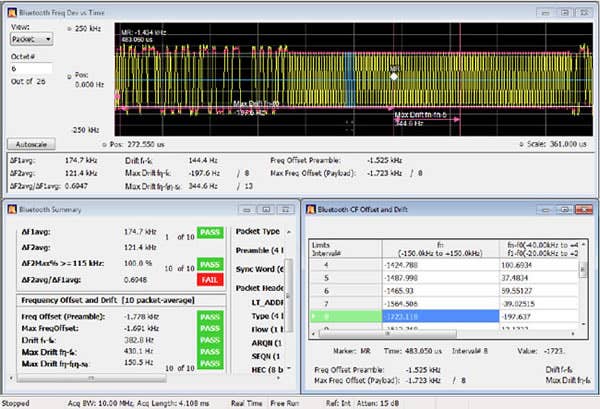
APCO 25 - SignalVu-PC application SV26 enables quick, standardsbased transmitter health checks on APCO P25 signals. The following image shows a Phase II HCPM signal being monitored for anomalies with the spectrogram while performing transmitter power, modulation and frequency measurements to the TIA-102 standards specification.
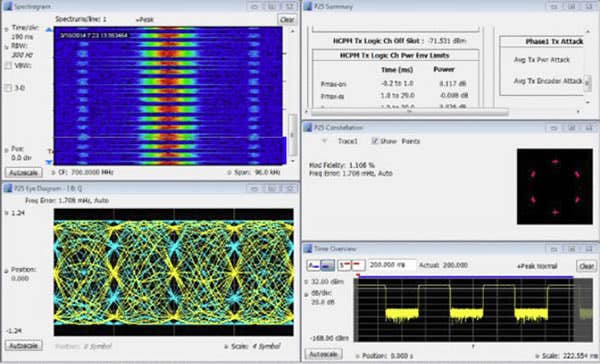
LTE - Application SV28 enables the following LTE base station transmitter measurements:
- Cell ID
- Channel power
- Occupied bandwidth
- Adjacent channel leakage ratio (ACLR) Spectrum emission mask (SEM)
- Transmitter off power for TDD
- Reference Signal (RS) Power
The measurements follow the definition in 3GPP TS Version 12.5 and support all base station categories, including picocells and femtocells. Pass/Fail information is reported and all channel bandwidths are supported.
The Cell ID preset displays the Primary Synchronization Signal (PSS) and the Secondary Synchronization Signal (SSS) in a Constellation diagram. It also provides Frequency Error.
The illustration below shows spectral monitoring with the spectrogram display combined with a Cell ID/Constellation, Spectrum Emission Mask and ACLR measurements.
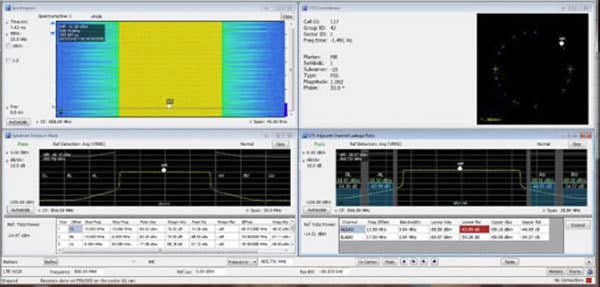
Mapping - The SignalVu-PC MAP application enables interference hunting and location analysis. Locate interference with an azimuth function that lets you draw a line or an arrow on a mapped measurement to indicate direction, or use the available Alaris smart antenna with automated azimuth placement.
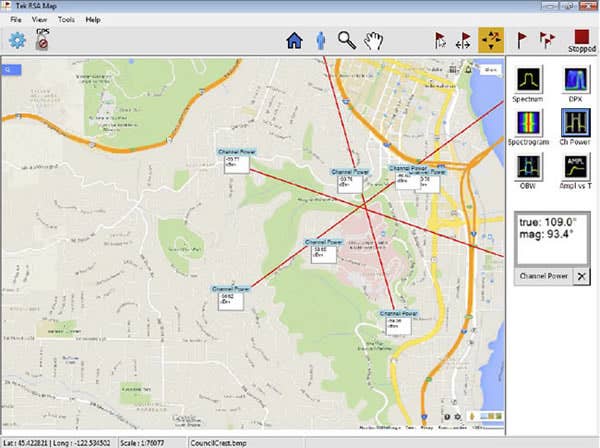
Signal survey/classification - Application SV54 enables expert systems guidance to aid the user in classifying signals. You can quickly create a spectral region of interest, enabling users to identify and sort signals efficiently. The spectral profile mask, when overlaid on top of a trace, provides signal shape guidance while frequency, bandwidth, and channel number are displayed allowing for fast classification. WLAN, GSM, WCDMA, CDMA, Bluetooth standard and enhanced data rate, LTE FDD and TDD, ATSC and other signals can be quickly and simply identified. Databases can be imported from your H500/RSA2500 signal database library for easy transition to the new software base.
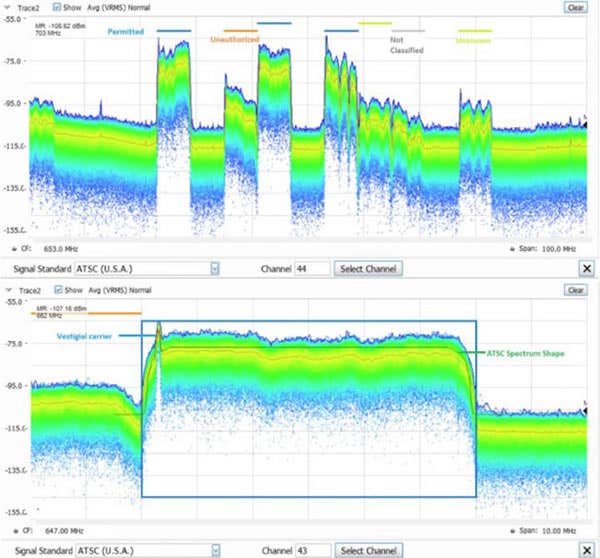
A typical signal survey is show below. The survey is of a portion of the TV broadcast band, and 7 regions have been declared as either Permitted, Unknown, or Unauthorized, as indicated by the color bars for each region. In the detail illustration, a single region has been selected, and since we've declared this to be an ATSC video signal, the spectrum mask for the ATSC signal is shown overlaid in the region. The signal is a close match to the spectrum mask, including the vestigial carrier at the lower side of the signal, characteristic of ATSC broadcasts.
Return loss/VSWR, distance to fault, cable loss - Perform maintenance and troubleshooting tasks with ease. When equipped with the option 04 tracking generator, the Tektronix RSA503A with application license SV60xx-SVPC makes one-port measurements on cables, devices and antennas.
Shown below is the return loss vs distance for a cable with an inserted barrel and an extension cable. The point at M2 (17.638 m, MR) is the barrel connector and the point marked by M1 at 19.725 m is the end of the cable.
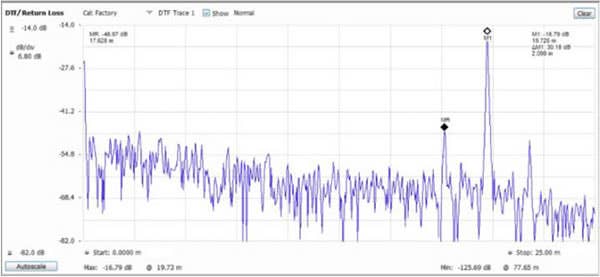
Shown below is the return loss of a bandpass filter measured from 700 MHz to 2.6 GHz. Markers have been placed a 1.48 GHz (-34.4 dB return loss) and at 1.73 GHz (-11.68 dB return loss), indicating the best and worse match in the passband of the filter.
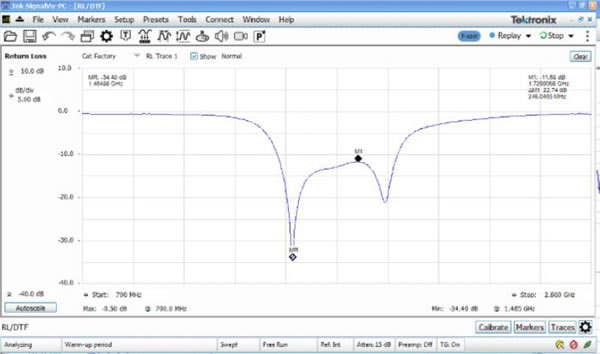
Playback - Application SV56, Playback of recorded signals, can reduce hours of watching and waiting for a spectral violation to minutes at your desk reviewing recorded data.
Recording length is limited only by storage media size, and recording is a basic feature included in SignalVu-PC. SignalVu-PC application SV56 (Playback) allows for complete analysis by all SignalVu-PC measurements, including DPX Spectrogram. Minimum signal duration specifications are maintained during playback. AM/FM audio demodulation can be performed. Variable span, resolution bandwidth, analysis length, and bandwidth are all available. Frequency mask testing can be performed on recorded signals, with actions on mask violation including beep, stop, save trace, save picture, and save data. Portions of the playback can be selected and looped for repeat examination of signals of interest. Playback can be skipfree, or time gaps can be inserted to reduce review time.
Clock time of the recording is displayed in the spectrogram markers for correlation to real world events. In the illustration below, the FM band is being replayed, with a mask applied to detect spectral violations, simultaneous with listening to the FM signal at the center frequency of 92.3 MHz.
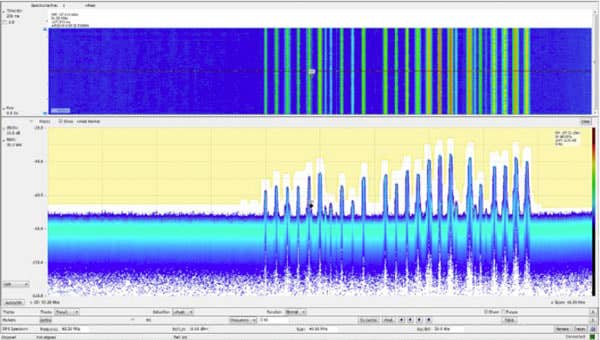
DataVu-PC for Multi-Instrument Recording and Analysis of Large Recordings
DataVu-PC software can control two spectrum analyzers simultaneously with independent settings. This allows you to monitor a wide span, while recording at up to 40 MHz bandwidth at any frequency in the range of the instrument. Once recorded, DataVu-PC can find and mark signals of interest based on amplitude and frequency-mask characteristics, eliminating the need for manual inspection of long recordings. Pulse measurements are available on up to 2,000,000 pulses.
Instrument Controller for USB Spectrum Analyzers (Sold Separately)
For field operations, a complete solution requires a Windows Tablet or laptop for instrument operation, record keeping and communication. Tektronix recommends the Panasonic FZ-G1 tablet computer for controlling the RSA503A and as a standalone unit.
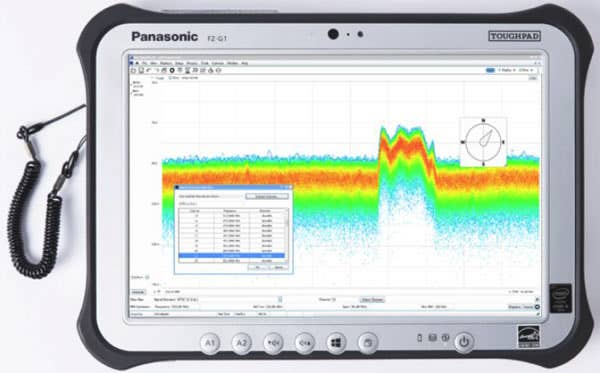
Key Specifications for Tablet Controller
- Windows 10 Pro 64-bit operating system
- Intel(R) CoreTM i5-6300U vProTM 2.4-3.0 GHz Processor
- 8GB RAM
- 256 GB Solid State Drive
- 10.1 in. (25.6 cm) Daylight-readable screen
- 10-point Multi Touch+ Digitizer screen plus included pen interface
- USB 3.0 + HDMI Ports, 2nd USB Port
- Wi-Fi, Bluetooth and 4G LTE Multi Carrier Mobile Broadband with Satellite GPS
- MIL-STD-810G certified (4 in. drop, shock, vibration, rain, dust, sand, altitude, freeze/thaw, high/low temperature, temperature shock, humidity, explosive atmosphere)
- IP65 certified sealed all-weather design
- Integrated microphone
- Integrated speaker
- On-screen and button volume and mute controls
- Integrated battery backup for hot-swap of battery packs
Smart Antenna for Interference Hunting (Sold Separately)
Tektronix offers the Alaris DFA-0047 smart antenna with built-in USB compass for direction finding and interference hunting applications. A summary of features and specifications:
- Frequency Range: 20 MHz - 8.5 GHz
- Trigger control for one-hand operation with functions for Preamp on/off, band switch, and push to measure with SignalVu-PC with MAP option
- Standard armrest extension for ease in long interference hunting sessions
- Transit case available
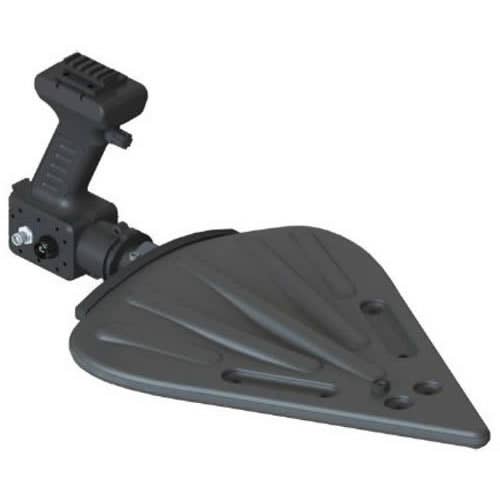
| Country of Origin | United States |
|---|---|
| Brand | Tektronix |
| Condition | NEW |
- 1 - USB 3.0 Cable (2 M)
- 1 - A-A Connection
- 1 - Screw Lock
- 1 - Shoulder Strap
- 1 - Carrying Case
- 1 - Connector Covers
- 1 - WFM200BA Li-Ion Rechargeable Battery Pack
- 1 - AC Power Adapter
- 1 - Power Cord
- 1 - USB Memory Device with SignalVu-PC API and Documentation Files
- 1 - WFM200BA Li-Ion Battery Pack Instructions (Printed)
- 1 - Quick-Start Manual (Printed)





